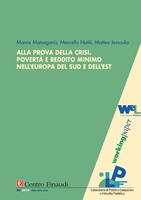- Ricerche e Progetti
- Biblioteca della Libertà
- Pubblicazioni e Working Paper
- Articoli e media
- Eventi e notizie
2016
Alla prova della crisi. Povertà e reddito minimo nell'Europa del Sud e dell'Est
WP-LPF 5/2016
- Categoria/Category
- WP-LPF 2016
- Autore/Author
- Matteo Jessoula, Manos Matsaganis , Marcello Natili
- Editore/Publisher
- Centro Einaudi
- Luogo/City
- Torino
- Articolo completo/Full text
- wp_lpf5_2016-completo.pdf
Abstract
In recent years, poverty and anti-poverty measures have gained new momentum in Southern and Eastern European countries, which have traditionally featured weak social safety nets. This was the result of three main factors: i) increased “problem pressure” in most countries, as a consequence of the recession and austerity measures; ii) in some cases, pressure from supranational/international organizations such as the EU and the IMF, also including various forms/degrees of conditionality; iii) domestic political dynamics. Against this backdrop, the aim of the paper is twofold. On the one hand, it reviews the main changes adopted in the field of anti-poverty minimum income protection in the countries along the Southern and the Eastern European borders. Distinct reforms patterns emerge, with some countries strengthening their traditionally weak model (Latvia, Lithuania and Spain), others introducing rationalizing and cost-containment measures (Portugal and Romania), and finally one introducing only recently pilot reforms (Greece). On the other hand, those developments are compared with the Italian trajectory. This reveals that poverty has not been considered a priority in the Italian political agenda and, although promising measures have been recently approved, the Italian investment in this policy field remains insufficient.







